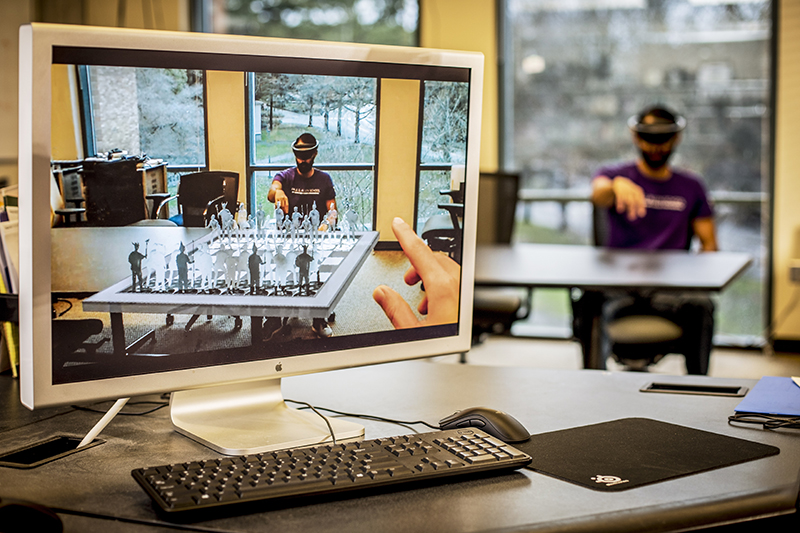The University of Washington launched a new augmented and virtual reality research center funded by Facebook, Google, and Huawei to accelerate innovation in the field and educate the next generation of AR and VR researchers and workers.
Photo: Dennis Wise/University of Washington
The University of Washington announced the creation of a $6 million virtual reality (VR) and augmented reality (AR) research lab funded by Facebook, Google, and Huawei. The purpose of the research center, according to the press release, is to “accelerate innovation in the field and educate the next generation of researchers and practitioners.”
The UW Reality Lab will be housed in the Paul G. Allen School of Computer Science & Engineering, located in the city of Seattle, hub for VR and AR innovation. The new lab will bring together an interdisciplinary team of faculty, graduate students and undergraduates who will work in areas such as 3D computer vision and perception, object recognition, graphics, game science and education, distributed computing, stream processing, databases, computer architecture, and privacy and security.
“Allen School faculty have produced pioneering research in many of the areas that underpin AR and VR technologies, including computer vision, graphics, perception, and machine learning,” said Hank Levy, Allen School director and Wissner-Slivka Chair in Computer Science and Engineering. “Through our partnership with Facebook, Google, and Huawei, the Allen School and UW will be at the forefront of the next great wave of AR and VR innovation — pursuing breakthrough research and educating the next generation of innovators in this exciting and rapidly expanding field.”
According to the university, the goal of the UW Reality Lab is to develop technology to create the next generation of VR and AR applications beyond entertainment and that will be available to a wider population.
“We’re seeing some really compelling and high quality AR and VR experiences being built today,” said center co-lead and Allen School professor Steve Seitz. “But, there are still many core research advances needed to move the industry forward — tools for easily creating content, infrastructure solutions for streaming 3D video, and privacy and security safeguards — that university researchers are uniquely positioned to tackle.”
The tech giants that invested in the research lab are hoping to propel the field by testing new ideas in a focused setting with computer science students.
“At Oculus Research, we’re committed to solving the biggest problems facing AR and VR. We’re excited about the rapid growth of AR and VR research and development in the Seattle area, and we look forward to working with the University of Washington and the UW Reality Lab to help invent the future,” said Michael Abrash, Chief Scientist, Oculus Research, and UW Reality Lab Advisory Board Member.
Paul G. Allen School assistant professor Ira Kemelmacher-Shlizerman, who is also Research Scientist at Facebook, will co-lead the center. “When you think about VR and AR, there are many challenging open problems that we all need to solve to be able to move the field forward,” said Kemelmacher-Shilzerman. “Progress is happening at a rapid pace, but to solve the really hard problems it requires academia and industry to work together.”
The UW Reality Lab advisory board is integrated by top personalities from the AR and VR community, including Michael Cohen, director of the Computational Photography Group at Facebook; Paul Debevec, senior researcher at Google Daydream; Shahram Izadi, CTO of PerceptiveIO; Wei Su, senior architect of the Fields Lab at Huawei Seattle Research Center; and Fan Zhang, Chief Architect and Head of Fields Lab at Huawei Seattle Research Center.
This article from Observatory of the Institute for the Future of Education may be shared under the terms of the license CC BY-NC-SA 4.0 
)
)


)